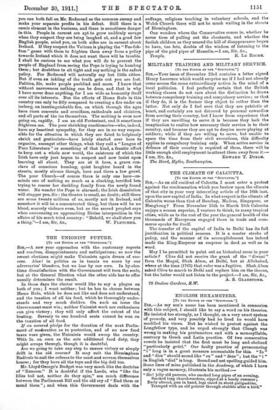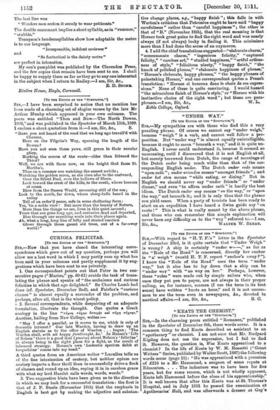ENGLISH HEXAMETERS.
[To THE EDITOR OP THE "SPECTATOR.:] Sin,—As my son's name has been mentioned in connexion with this subject, I should like to say a word on his theories. He insisted too strongly, as I thought, on a very exact system of prosody, and very possibly had he lived he would have modified his views. But he wished to protest against the Longfellow type, and he urged strongly that Clough was wrong in making his pentameters end with a monosyllable, contrary to Greek and Latin practice. Of two consecutive vowels he insisted that the first must be long and obelized "particularly gruel" Our faulty practice of pronouncing "i " long is in a great measure accountable for this. " Io " and " dies" should sound like " eo " and " deas "; but the " i " in English "dial" is long. Sound and not spelling guided him. Some lines of mine published in the Academy, of which I have only a vague memory, illustrate his method :-
"Ho! jolly old parsons, who smoked long pipes of an evening, Smoked long churchwardens, sipped at a beady rummer;
Early abroad, gun in hand, legs cased in stout galigaskins, Tramped with an old pointer through stubble after a bird." The last line was " Wonders men reckon it seemly to wear petticoats."
The double consonant implies a short syllable, as in "rummer," " stubble."
Tennyson's hendecasyllables show how adaptable the metre is to our language.
"Irresponsible, indolent reviewer" and "So fantastical is the dainty metre" are perfect in intonation.
My son's pamphlet was published by the Clarendon Press, and the few copies that remain have been sent to me. I shall be happy to supply them as far as they go to any one interested in the subject when I return to Radley.—I am, Sir, &c., Rirare House, Halle, Cornwall. E. D. &TORR.







































 Previous page
Previous page